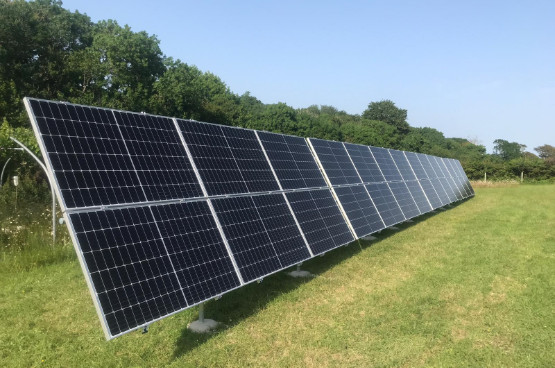The Autumn Budget is the UK government’s key financial announcement each year but what does the budget say about solar PV?
Net Zero and Clean Energy
3.74 Transitioning to Net Zero and delivering on the government’s clean energy superpower mission is central to ensuring sustainable and resilient long-term growth. The government will deliver this transition in a way that captures economic opportunities, securing investment and growth in clean energy industries across the UK.
3.75 The government has already taken steps to unblock and drive investment into the UK’s clean energy industries.
• Reversed the de facto ban on onshore wind in England, which will help deliver cheap, reliable, and clean energy across the UK.
• Approved four major solar projects of nearly 2GW, enabling the creation of thousands of jobs.
• Significantly increased the budget for the sixth Contracts for Difference allocation round, resulting in a record number of contracts.110
• Secured £34.8 billion of private investment into the UK’s clean energy industries around the International Investment Summit.111
3.76 The Budget builds on these first steps and seeks to maximise the growth opportunities of the Net Zero transition and grow UK clean energy industries by:
• Providing £3.9 billion of funding in 2025-26 for Carbon Capture, Usage and Storage Track-1 projects to decarbonise industry, support flexible power generation, and capitalise on the UK’s geographic and technical strengths.
• Delivering on the first steps of the clean energy superpower mission, with £125 million in 2025-26 for Great British Energy, which will be headquartered in Aberdeen.
• New nuclear will play an important role in helping the UK achieve energy security and clean power, while securing thousands of good, skilled jobs. This settlement provides £2.7 billion of funding to continue Sizewell C’s development through 2025-26. The equity and debt raise process for this project will shortly move to its final stages and will conclude in the spring. As with other major multi-year commitments, a Final Investment Decision on whether to proceed with the project will be taken at Phase 2 of the Spending Review.
• The government will provide support for the first round of electrolytic hydrogen production contracts, harnessing renewable energy to decarbonise industry across the length and breadth of the UK.
3.77 Accelerating grid connections and building new network infrastructure is central to unblocking private investment, delivering growth in clean energy industries and other growth sectors like AI, data centres, and manufacturing. The government is working with the new National Energy System Operator (NESO) and Ofgem to develop a robust grid connection process, to ensure viable projects are
connected in a timely manner.
3.78 Making buildings and homes cleaner and cheaper to run is essential for meeting Net Zero and supporting energy security and resilience. Through the Budget, the government is providing support to both the public sector and households by:
• Delivering hundreds of local energy schemes to help decarbonise the public estate through the Public Sector Decarbonisation Scheme, with over £1 billion of funding over three years.
• Taking the first step towards a Warm Homes Plan, committing an initial £3.4 billion towards heat decarbonisation and household energy efficiency over the next three years. This includes £1.8 billion to support fuel poverty schemes, helping over 225,000 households reduce their energy bills by over £200. The government will increase funding for the Boiler Upgrade Scheme in England and Wales this year and next, following the high demand for the scheme. The government is also providing funding to grow the heat pump manufacturing
supply chains in the UK to support the plan.
3.79 To support existing firms to decarbonise and grow, the government has also confirmed £163 million to continue the Industrial Energy Transformation Fund over 2025-26 to 2027-28.
3.80 The transition to electric vehicles (EVs) is crucial to decarbonising transport and will support growth and productivity across the UK. There are now more than 1 million electric cars on our roads.112 The government has committed to phasing out new cars that rely solely on internal combustion engines by 2030 and that from 2035 all new cars and vans sold in the UK will be zero emission. The government is
building on this by:
• Investing over £200 million in 2025-26 to accelerate EV chargepoint rollout, including funding to support local authorities to install on-street chargepoints across England. This will build on the UK’s existing charging network, which continues to grow at pace with over 70,000 public chargepoints.113
• Providing £120 million in 2025-26 to support the purchase of new electric vans via the plug-in vehicle grant and to support the manufacture of wheelchair accessible EVs.
• Maintaining tax incentives to purchase electric cars through Vehicle Excise Duty First Year Rates and the Company Car Tax regimes, as well as by extending 100% First Year Allowances for electric cars and chargepoints for a further year.
3.81 The government is also committed to realising the benefits that aviation decarbonisation offers for Net Zero and growth. To support the development and production of innovative advanced fuels to decarbonize aviation, the government will extend the Advanced Fuels Fund for a further year.
3.82 The government will also invest in the natural environment and in climate mitigation and adaptation to protect the economy from the impacts of climate change. The Budget confirms £5 billion over two years to support the transition towards a more productive and environmentally sustainable agricultural sector in England and over £400 million of support for tree planting and peatland
restoration. The government will invest £2.4 billion over two years in flood resilience to support the building of new flood defences alongside the maintenance of existing assets to protect communities.
3.83 The government is committed to securing the UK’s place as a global leader in clean energy, protecting consumers and driving economic growth. The government has commissioned advice from NESO on 2030 delivery and, using this, will publish its own more detailed Clean Power 2030 Action Plan. The government will also respond to the Climate Change Committee’s Progress Report, publish an updated Carbon Budget Delivery Plan, and capitalise on UK clean energy strengths through the new Industrial Strategy.
To Summarise
While Chancellor Rachel Reeves didn’t specifically mention solar in her address to Parliament, she confirmed that £125 million will be allocated in 2025 to establish the state-owned investment initiative, Great British Energy. Great British Energy is central to the Government’s vision of transforming the UK into a clean-energy superpower. Beyond advancing clean energy, the Government are committed to investing in future-focused industries, aiming to create 650,000 jobs nationwide by 2030. They are also funding home insulation upgrades to help families reduce energy costs, enhance access to nature, promote biodiversity, and safeguard our landscapes and wildlife.

 Solar PV Contractor of the Year 2024
Solar PV Contractor of the Year 2024
